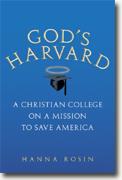God's Harvard
Hanna Rosin
book reviews:
· general fiction
· chick lit/romance
· sci-fi/fantasy
· graphic novels
· nonfiction
· audio books
· author interviews
· children's books @
curledupkids.com
· DVD reviews @
curledupdvd.com
newsletter
win books
buy online
links
home
for authors
& publishers
for reviewers

 |
God's Harvard: A Christian College on a Mission to Save America Hanna Rosin Harcourt Hardcover 304 pages September 2007 |
|
Hanna Rosin has been covering the religious beat for the Washington Post since 1997. In the course of her job, she became familiar with Patrick Henry College, a college aimed at Evangelical youth, many of them home-schooled. Patrick Henry is still a very new school: it opened in the fall of 2000, but it already has graduates who are influential in Washington, D.C. In fact, that's its mission: to train Evangelical youth to take the lead in all aspects of American life, from education to espionage, but most especially in domestic politics. For a year and a half, Rosin was embedded at Patrick Henry. She got to know many of the students, from the eager freshman to more jaded seniors, as well as to see Patrick Henry's first big crisis (when faculty quit, claiming that intellectual rigour was being sacrificed to Evangelical beliefs).
The book opens with freshman orientation, which allows Rosin to show the reader around campus as the students explore their new home. Immediately, the differences between Patrick Henry and a normal American college appear: it has a strict dress code (no shorts, flip-flops, or cleavage), rules prohibiting certain CDs or DVDs, room checks for cleanliness, mandatory chapel, and the only dating allowed is parent-approved 'courting.' In fact, the sheltering atmosphere feels more like a middle-grade boarding school than a college. There is a key difference, however: the students of Patrick Henry, for the most part, completely approve of the strict regulation and monitoring of every aspect of their lives. Many of them were homeschooled by fervent Evangelicals, and they are used to associating God and religiousness with a rejection of most of contemporary American society. All of them feel a close, personal relationship with Jesus and God, and try to model their lives after their interpretation of Christian scripture. All of them are also high achievers, traditional type-A kids who compare SAT scores and spend hours each day studying. After this introduction, Rosin explores various tensions within Patrick Henry, and by implication within the Evangelical community at large. One of the bigger issues concerns the role of women. The girls of Patrick Henry are as ambitious as the boys, but Evangelicalism preaches that the woman's place is in her house, raising (preferably homeschooling) her children, supporting her husband, and keeping the household running smoothly. This tension can create problems when the girls plan their futures. As Rosin explains, "Even the most ambitious ones - those who wake up at 3 A.M. to study, shin on the mot court team, keep updated lists of White House and congressional contacts, and hire professional resume designers - told me without reservation that as soon as they had children they would quit their jobs to raise them." Moreover, "when a female professor gets pregnant at Patrick Henry, she resigns, because it's an unspoken rule that no child care is allowed." In addition the philosophies behind these beliefs, Rosin introduces the reader to Farahn, a supposed bad girl who doesn't fit in, and Elisa, a golden girl of the school who finds herself forced to choose between finding a husband and getting a career. This mix of general and specific, philosophical and private aspects is present throughout the book in more than just the role of women and helps the reader get a full understanding of the subculture. Perhaps the biggest concern Rosin explores is a fundamental difficulty of Patrick Henry. It wants its graduates to be able to succeed in mainstream America and encourages extended off-campus internships among the students. At the same time, it expects its students to remain staunch Evangelicals, untouched by what is, in some cases, a student's first contact with contemporary American life. Rosin displays the differences between under- and upper-classmen; while none that she spoke to lost their faith in Jesus, many moderated their views and became somewhat embarrased by the fervor of the freshmen. Yet another contradiction becomes a major issue later in the book: can Patrick Henry be intellectually rigorous and avowedly Evangelical? Its biology professor, while she has a Ph.D., teaches creationism. And when a star professor who runs the freshmen class "Freedom's Foundations" takes his challenges of Evangelicism too far, founder Michael Farris tells him to change his syllabus or face termination. The student body divides, and the latent contradiction becomes the subject of fierce debate. Rosin follows this debate and shows for the reader that it put many students, and professors, in tremendous moral turmoil. Through exploring Patrick Henry, Rosin really explains the subculture of Evangelicism, taking on all of its red-button issues. She's also created a compelling picture of that strange in-between place college students experience, when they're still struggling to decided what kind of adults they want to become. Her clear and straightforward prose brings the various people to life, and leaves the reader with an enriched view of this important aspect of American society. Originally published on Curled Up With A Good Book at www.curledup.com. © Eva Kay, 2008 |
|
|
|
 Click here to learn more about this month's sponsor! |
|
| fiction · sf/f · comic books · nonfiction · audio newsletter · free book contest · buy books online review index · links · · authors & publishers reviewers |
|
| site by ELBO Computing Resources, Inc. | |
 In
In